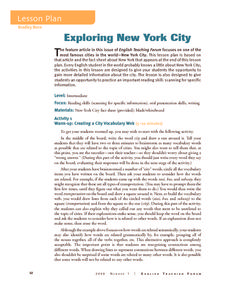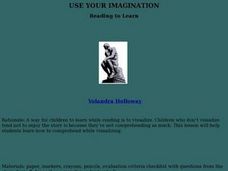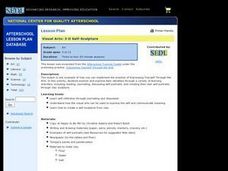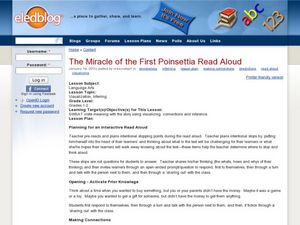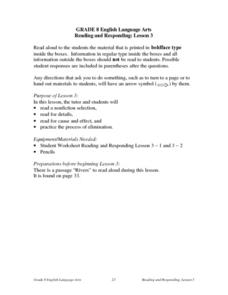Baylor College
People and Climate
Model how the sun's energy strikes the planet and help your class relate it to a climate map. Assign small groups an individual climate zone to discuss. They reflect on and research how humans survive in the assigned climate and write a...
Baylor College
What Is a One Part Per Million Solution?
Water may appear to be crystal clear, but there could be dissolved substances present. Lab groups make a one-part-per-million of a food coloring solution to demonstrate this concept. As part of an outstanding unit about water, this...
Institute of Electrical and Electronics Engineers
Sugar Crystal Challenge
Blow your learners' minds with a sweet lesson on nanotechnology that uses sugar to demonstrate the difference nanoscale surface area makes in dissolving and crystal formation. Plenty of supportive background information is read to...
Federal Reserve Bank
The Free Silver Movement and Inflation
Why are US dollars no longer backed by gold and silver? What is our medium of exchange, and what would it be like to live in a barter economy? Learners consider these questions, as well as learn about the major historical events in the...
Global Publishing Solutions
Exploring New York City
Your class members will get up close and personal with the Big Apple in this fantastic lesson, which introduces learners to not only the concept of a city, but also provides a thorough overview of New York City itself and its...
Curated OER
Pigs: A Visual Splendor
Third graders practice using visualization to aid in their reading comprehension. After a reading a chapter from the book "Charlotte's Web," students write a brief summary of the plot using their visualizations, aided by reading...
Curated OER
Reading Power through Visualizations
Students practice visualizing images as they read in this lesson. Students create an oral collage with their visualizations. Students are then given three separate scenarios to visualize, and are assessed on their description of their...
Curated OER
Visualization
Students practice visualization as a strategy to increase reading comprehension. They practice while the teacher reads a poem to them before reading a poem silently to themselves. Next, they practice making mental images while reading a...
Curated OER
Use Your Imagination: Reading to Learn
Students examine the process of visualization as a means of comprehending what happens in a story. They read a chapter in a novel, visualize what happened in their mind and then draw a picture of what they visualized. They write two...
Curated OER
The Adventures of Visualization
Fourth graders pretend they are going on a trip to Mars as they close their eyes and visualize the journey. They discuss what they saw on the journey to determine how one student may visualize something different than another. Next, they...
Curated OER
Seeing What You Read
Students practice visualizing what they read and hear in a text. They listen to selected passages from a text read by the instructor. Students discuss the visual pictures they see when listening to the text. After listening to a...
Curated OER
Read It, Picture It! Reading to Learn
Students examine the reading comprehension strategy of visualization. They practice visualization by making pictures in their mind. They draw the pictures from their visualizations with explanations.
Novelinks
The Cure: Guided Imagery
Prepare class members for a discussion of Sonia Levitin's dystopian novel The Cure, by leading them on a guided imagery exercise designed to encourage visualization of written descriptions.
Curated OER
Visualization
Students review the meaning of summarization and talk about the meaning of visualization and list them on the board. They listen to "What A Wonderful World" and picture the images in their minds. They then read part of their chapter...
Curated OER
Visual Arts- 3D Self-Sculpture
Students construct three dimensional self-portraits. In this visual arts lesson plan, students use clay to create a self-portrait. Students make the clay and discuss their self-portrait.
Curated OER
Patterns Across Cultures: The Fibonacci Sequence in Visual Art
Learners study the origin of the Fibonacci Sequence. In this investigative lesson students identify works of art where Golden Spiral or Ratio appear.
Curated OER
The Hello Goodbye Window: Visual Art
Learners create a portrait of themselves with a grandparent. In this visual art lesson, students read the book entitled The Hello Goodbye Window and discuss the events. Learners then draw a portrait of themselves and their...
Curated OER
The French in Texas
Fourth graders examine early French exploration and settlement in Texas. They read handouts, explore Internet websites and take notes, and create an illustrated journal with written entries.
Curated OER
Keyboard centers with Music You Can Read
Pupils play the letters provided in the format "Keyboard/Xylophone/Tone Bells" with the intention of using the "Music Only" format as skills progress. They study fingerings and chords when appropriate to skills.
Curated OER
Teaching Rhythm and Pitch Reading
Students practice correct rhythms and pitches during this short lesson for the middle school instrumental class. Objectives vary depending on music used for the lesson. Students assessed through group playing in class.
Curated OER
GREEK MYTH IN PAINTING
Second graders look closely at a Renaissance painting depicting an ancient Greek myth, review the term renaissance, hear a Greek myth that tells how the peacock got its tail, sequence the story, and identify the actions of the myth in...
Curated OER
My Monkey in the Jungle
Second graders create depictions of a monkey in its' natural habitat. Emphasis is placed on the artwork of Henri Rousseau and techniques of landscape and design. State standards are addressed in this lesson.
Curated OER
The Miracle of the First Poinsettia
Connecting to literature and learning how to infer are two great reading strategies everyone needs to know. Here, the class will read along with the story The Miracle of the First Poinsettia, review folktales as a genre, and make...
Curated OER
Reading and Responding: Lesson 3
Eighth graders practice reading a nonfiction selection. They read for details, read for cause and effect, and practice the process of elimination. They use these strategies when answering multiple choice questions in tests.




